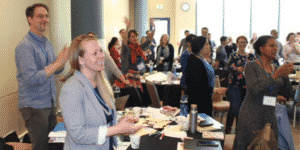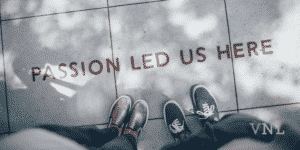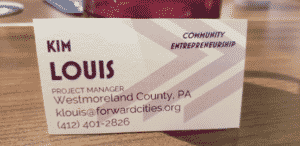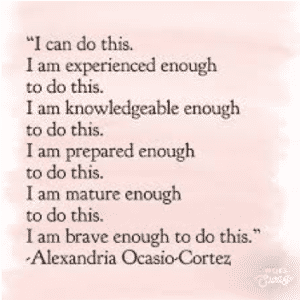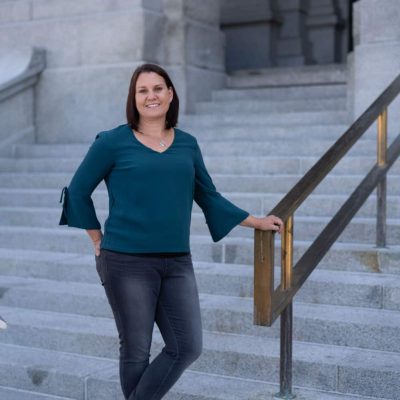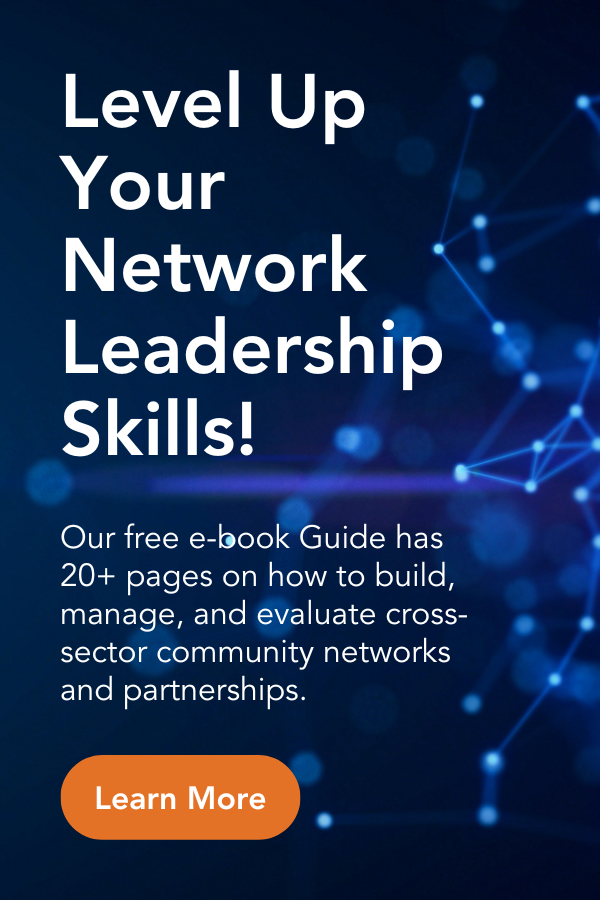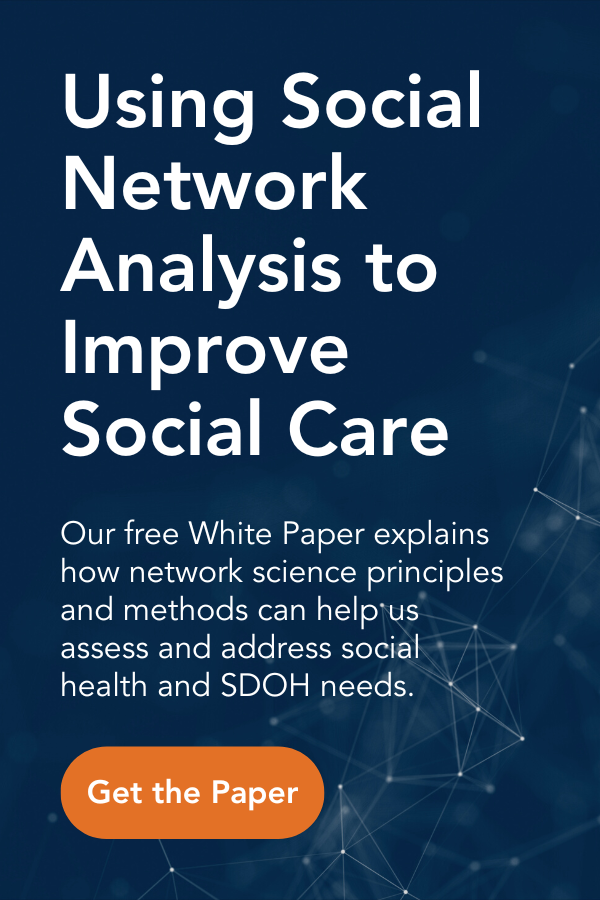Inclusive Entrepreneurship: The Future of Social Impact
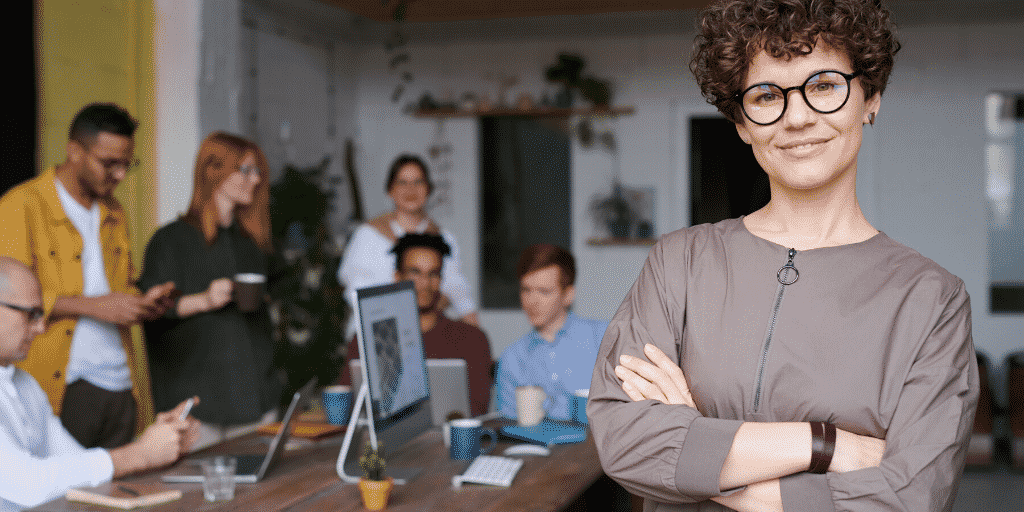
Last week I had the pleasure to speak at the Forward Cities National Conference – a national gathering of people committed to building the ecosystem to support inclusive innovation and entrepreneurship. While most of this event was what I expected, what I did not expect was the quick immersion into the world of the inclusive entrepreneurship movement that I did not even know was on the rise. But now that I know, I cannot stop thinking about how exciting the future of an inclusive innovation and entrepreneurial ecosystem is, especially for social impact! Inclusive entrepreneurship is all about social connectedness, driven by a theory that if we can provide the scaffolding – the social support network – for people who of all colors, ages, and backgrounds who have the grit and drive needed to give ideas a life – great creative change can happen. I’m obsessed with understanding how social support influences our health, well-being, and economic outcomes, so this entry into this movement is one I am all in on.
I was honored to find myself in the company of a panel of amazing network scholars with Nicolas Gunkel moderating. We covered how to conceptualize and measure social networks in an innovation ecosystem that supports entrepreneurs and how these methods are representing inclusive voice in an authentic way. We were asked to think about our role in the ecosystem as analysts and the role that data plays in setting policy agendas and informing funding initiatives.
Then Things Got a Little Uncomfortable...
While it was inspiring to learn about all the efforts to take a deep look at the stereotypical profiles of what successful entrepreneurship looks like, the really dynamic part of attending this conference were the moments and learnings that felt less familiar or comfortable. I realized that there is an entire movement towards “Inclusive Entrepreneurship” on the rise across the country. It bucks nearly all the typical assumptions about how entrepreneurs are supposed to behave to be successful. Specifically, it rejects that there is an elite, small group of people able to really bring a solution to market and that only these powerful few can be trusted to know who should be in and who should be out. Forward Cities and others promote a model that raises the issues of structural racism, elitism, and the assumptions that successful entrepreneurship must look mostly white and male with few exceptions.
At Forward Cities, I found myself in several sessions feeling kind of uncomfortable. I say that in a “this is an important, uncomfortable-feeling moment” kind of way. This group is leading a conversation that I sorely needed to hear. There was no need to explain or apologize for talking about hard subjects-it was expected. People all around me were talking about the same angst and doubt that I was holding on to about fitting into the entrepreneurship world. They were so open and owned the outcome – we need more inclusive opportunities to solve big wicked social problems!
Day 1’s keynote Rodney Sampson, CEO and Cofounder of Opportunity Hub, had a provocative discussion with Christopher Gergen about the lack of capital in minority communities for starting a business and the other many structural barriers that women and minority owned businesses face. But then he talked about his own experiences and work to support opportunities to make change.
Later, I loved meeting Kim Louis, entrepreneur and nonprofit director who led a dynamic session on design thinking community solutions WITH the community. (and we connected around having daughters who are likely going to grow up in key roles to make change in the world!). That afternoon, tours of the Pittsburgh entrepreneurial ecosystem brought everyone into the reality of how people can thrive with right kind of social support.
Inclusive Entrepreneurship is a Movement, and I’m Just Catching up!
I have become excited by these ideas, not just personally, but because in a space where a lot of people are trying to bring business to social impact, these ideas make sense. I have looked around for more people involved in this space. I have tried to get a sense of where it has been and where it is going. It was easy to find a few definitions of inclusive entrepreneurship.
A definition from Wikipedia: “The use of the word ‘inclusive’ indicates a belief that entrepreneurship is for all and that the personal qualities and conditions required for entrepreneurship are not the prerogative of a privileged, highly educated few. Indeed, millions of people across the globe take complex decisions, manage risk, find new innovative solutions, and collaborate with others just to survive in their daily lives. However the obstacles and risk they face when trying to make the leap from survival to long-term sustainability are proportionally far greater than those involved in launching a new company on the stock exchange.” (citation)
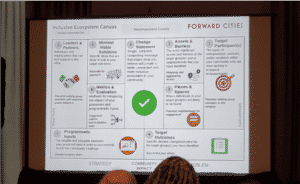
I Came Away Knowing That I’m Part of Something Bigger - Inclusive Entrepreneurship!
These couple of days made a huge impact on me. As a female founder of a small technology and data science startup company, I left there believing that I can be the most kick ass entrepreneur in the world, if I want to be, despite being a middle-aged woman, with three spirited girls at home all under ten, a long-time tenured university professor, and with all my history in the public and nonprofit sector. You read that right: Not one of those characteristics describe the typical image of a successful private sector entrepreneur. But you see, in this crowd, they see all my traits as assets, because in fact, I am also a woman who became a professional whitewater kayaker and got her PhD in her 20’s, gave birth to three spirited girls/was tenured/ started a nationally recognized Network Science research center based in her 30’s, and brought several products to market and founded a thriving data science/community-driven/tech company in her 40’s. I left believing that these experiences show grit, and drive, and experience, and tenacity. They saw me as smart and successful, and honored other people like me. I’m sure that I’m still just getting started on all I can accomplish. (Watch out 50’s – I think I’ll run for office!).
As the CEO of COStarters, Enoch Elwell, said to me later that week when we connected after meeting at the conference…”these are the moms trying to start a craft business, or the line worker hustling on the side to make a product come to life, or the young African American male who has numerous barriers to capital but knows he would thrive as a CEO.” I asked Enoch if he thought that someone like me, “the professor turned startup founder” fell into that group, and he said yes. That was meaningful to me, as over the course of the last year, I’ve had a few people look me directly in the face and say “you know you couldn’t be a CEO right”? You are an “ideas” person, but not a CEO. That must have been code for “you are too female, you are too old, you don’t have the right pedigree, you might be smart but not about business, and you don’t have the right background”. But something I have always known about myself is that I don’t see the stop signs. I only see the highway. And I’m constantly looking back at the doubters thinking “I wonder if they could accomplish all the things I’ve done and still believe there is more to learn?” I think I’m pretty hard-core, and I hope that when my daughters think of their mommy, they reflect that they are all they need to be to make a huge impact in this life.
As US Representative Alexandria Ocasio-Cortez recites before walking on the stage to debate, “I am experienced enough to do this. I am knowledgeable enough to do this. I am prepared enough to do this. I am mature enough to do this. I am brave enough to do this.” (citation) Oh yeah girl – we are!
Imagine if We Treated All Entrepreneurs Like They Were Experienced, Knowledgeable, Prepared, Mature, and Brave Enough to Do This?
There are a lot of business accelerators out there that promote the very typical entrepreneur model. Imagine if this model was tweaked just a bit. What if a criterion for judging potential success was based on a person’s success at working as Executive Directors of a small social impact organization? Or the extent to which they deeply understood the problems they were trying to solve? Imagine if we honored their lived experiences, knowledge, and amazing ability to hustle to maintain organizations that had very uncertain funding streams and high public accountability? This would be the majority of the nonprofit sector leadership, which is rarely identified as potential CEOs to run corporations.
Imagine if we lifted up the women and minorities that tend to lead these organizations, and truly promote a spirit of inclusive entrepreneurship? My hypothesis is that these CEOs would stand up on their stages to give their pitches with kick ass presentations that make real sense. What if there was an agreement that in exchange for all this support, 2% of all profits from their company would go back into the original organization that fostered them? This would build a sustainable funding stream to continue to build the pipeline of inclusive entrepreneurs.
Reid Hoffman, Founder of LinkedIn said it well in this episode of Masters of Scale, when he interviews Nancy Lubin, founder of Crisis Text Line. He describes her this way, “If you ask me, Nancy Lublin is the entrepreneurial equivalent of Indiana Jones. I wanted to talk to her for this episode because she is a 10 out of 10 when it comes to grit. And she also does her work in the not-for-profit sector, which has even more landmines than the commercial world. Capital is harder to come by, talent is harder to recruit, and our overall society — at least here in the U.S. — broadly rewards commercial people more than they reward non-profit people.”
And as a tenured professor, 3 time mommy, and professional whitewater kayaker turned start up founder, I also kind of love Reid’s theory about when it’s too late to enter into the “entrepreneurial party“:
“I believe it’s never too late to join the entrepreneurial party. Founding a business can be your second, third, or hundredth act.”
I’m convinced that Forward Cities’ goals to map out the ecosystem of inclusive entrepreneurship is a worthy and useful effort. I am obsessed with understanding the social support systems of people and how that leads them to health, well-being, and economic outcomes. My guess is that the social support network of minority and women entrepreneurs looks different from self-described “serial entrepreneurs.” There is something about these differences that could be fostered and supported in just the right way to solve these big wicked social problems of today. If we build the ecosystem up around these misfits of the private sector world, imagine what would happen!
I’m grateful for my time at the Forward Cities conference. And I’m fired up to stay involved and be a part of the inclusive entrepreneurship movement. Watch out world! This mama is taking Visible Network Labs into the space of legends.
About the Author: Dr. Danielle Varda
CEO, Founder, Professor, & Mother of Three Spirited Girls
Danielle is a scientist turned start-up founder, leading Visible Network Labs as CEO. Her combination of 20 years as a network scientist studying social connectedness and health, published author, 12 years as a tenured professor at the University of CO Denver, and her successful launch and scaling of the Center on Network Science came together in one big idea to start VNL. She is an entrepreneur, technologist, network scientist, fundraiser, and mother to three spirited girls. Her calling came when she realized her unique ability to develop technology solutions bridge complex systems science with everyday applications in communities, organizations, and business. She is a nationally known expert and keynote speaker on applied network science, with specific expertise in health system, public health system, entrepreneurial ecosystems, and educational system approaches. Danielle has published over 30 peer-reviewed articles on networks and their impact on health, well-being, and economic outcomes. Danielle leads VNL’s strategic partnership approach, is the company’s lead fundraiser, and has a vision for how to utilize network science to solve our most pressing and intractable problems.
In addition to her leading VNL, she is also an Associate Professor at the School of Public Affairs, University of Colorado Denver where she is Co-Director of the Center on Network Science, Director of the Nonprofit Concentration in the MPA program, and Advisor to the Dual MPA-MPH Degree. Additionally, she holds a secondary appointment in the Colorado School of Public Health, Department of Health Systems, Management, and Policy. She also has a courtesy Associate Professor appointment in the School of Information Sciences at the University of CO Boulder.
|
|
Thank you for Signing Up |

More News from Visible Network Labs
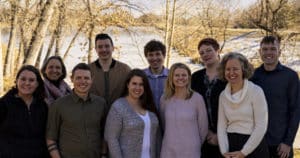

How I learned that anything is possible, if you are willing to take the leap!
